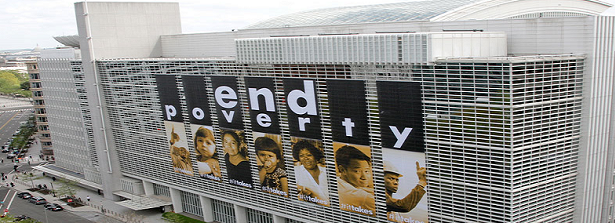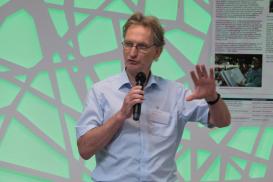Matchmaking and knowledge sharing between Dutch development programs and World Bank investments

Since 2015, the Netherlands and the World Bank Group collaborate to increase knowledge, support job creation, and secure the long-term sustainability of agriculture in developing countries, under the umbrella of the “Food for All” Partnership agreement. This Partnership brings together the World Bank Group and civil society, academia, government, private sector, and other stakeholders from the Netherlands. Wijnand van IJssel is a Dutch expert who is actually seconded at the Agriculture Global Practice within the World Bank in Washington to foster matchmaking and knowledge sharing.
Please find below an interview Wijnand van IJssel gave with “Netherlands for the World Bank“, a blog website operated by the team International Organizations within the Economic Department at the Royal Netherlands embassy in Washington, DC. In the interview he highlights that especially for the Dutch economy it is important to establish global networks such as with the World Bank, and shares his observations amongst others about the interest in proven technologies (with an affordable and sustainable business model behind it) that is appealing to client governments. He also gives some suggestions for how Dutch companies and organizations can make themselves more visible at the World Bank.
Tell us something about yourself
 Well, I was born and raised in Rotterdam. I received my Master’s degree in tropical forestry at Wageningen University a long time ago. After that, I spent 20 years in Mauretania, Bhutan, Costa Rica, Kenya, Vietnam, and Mozambique, with FAO, SNV, DHV Consultants, and eventually the Ministry of Foreign Affairs of The Netherlands. I love working in global development, particularly in the domains of rural development, sustainable land use, and environmental management. It has been great to be able to live in all these countries with different cultures and to meet different people – together with my family (my wife and three children, now all 20+). After 10 years at the Ministry of Foreign Affairs in The Hague, I opted for this secondment at the World Bank Group.
Well, I was born and raised in Rotterdam. I received my Master’s degree in tropical forestry at Wageningen University a long time ago. After that, I spent 20 years in Mauretania, Bhutan, Costa Rica, Kenya, Vietnam, and Mozambique, with FAO, SNV, DHV Consultants, and eventually the Ministry of Foreign Affairs of The Netherlands. I love working in global development, particularly in the domains of rural development, sustainable land use, and environmental management. It has been great to be able to live in all these countries with different cultures and to meet different people – together with my family (my wife and three children, now all 20+). After 10 years at the Ministry of Foreign Affairs in The Hague, I opted for this secondment at the World Bank Group.
What is your role within the World Bank?
I have been seconded for three years (2016-2019) to further develop the Food 4 All Partnership, signed between the Netherlands and the World Bank Group in 2015. The Partnership aims to find synergies and collaboration between Dutch knowledge programs and expertise in agriculture and food/nutrition and connect this with knowledge development and investment program needs of the World Bank. My role is to identify these needs and opportunities and stimulate collaboration between the Bank and The Netherlands. I focus on matchmaking and knowledge sharing between Dutch development programs and Bank investments. The ultimate goal is to enhance effectiveness of development investment and to strengthen the role of Dutch partners in that. I am based at the Agriculture Global Practice within the Bank.
How does the Food 4 All Program contribute to reducing poverty in the world?
The World Bank Group is a powerful institution when it comes to poverty reduction programs. It has considerable investment power, deep knowledge, and a lot of convening power. Given that the development objectives of the Dutch government and the WBG are aligned for global food security, it is only smart to build a Partnership to leverage the impact of our own Dutch knowledge and our more limited investment capacity.
What challenges do you run into?
There are plenty of challenges running a one-man shop without a budget inside the World Bank, but all managers and staff are open and willing to share information and are also eager to learn more. Connecting the most recent knowledge and innovative approaches to local operations can be a challenge as well, as client governments can be insecure about new ways to achieve better results and the impact on alliances and established interests.
On the side of the Netherlands, we are working on new forms of Partnerships with the World Bank. For example, Wageningen University & Research, our “Ivy League” university in agriculture and life sciences, realized that their relationship with the Bank was rather on an ad-hoc basis. They decided to intensify their partnership and by now, Louise Fresco, the Board Chair, has given a Food for All Talk at the Bank and WUR has a new account team for the WBG. Understanding the Bank is very important. Sometimes organizations fail to see that the World Bank is in fact an actual bank that provides loans to sovereign governments, who are responsible for the loan and decide on its allocation.
When it comes to IFC, they invest in local companies and financial institutions. Dutch financials such as FMO and Rabobank play a role in blended finance constructions, but for non-financial companies it is more about exploring opportunities for joint ventures for local investment. With the WBG we should look deeper into mechanisms to support the missing middle of small and medium sized enterprises. That would open up more opportunities for innovative technologies, inclusive business models, and public-private partnerships.
How can Dutch companies and organizations make themselves more visible at the World Bank?
We are living in a global knowledge and innovation economy. Especially for the Dutch economy (both the private sector and Dutch knowledge institutions), it is important to establish global networks. It is a lot of networking, and I notice that there is a lot of interest in proven technologies (with an affordable and sustainable business model behind it) that is appealing to client governments.
Thanks to the Food 4 All Partnership we also identify more opportunities for local government officials to organize study tours to the Netherlands – for example, when new loans are signed and additional resources become available. This is an efficient and timely way for Dutch partners to present themselves. Last year we had a study tour from India to the Netherlands, just recently an Uzbek mission visited the Netherlands to learn more on agricultural diversification, and currently we are preparing a mission for the Bangladesh livestock sector to the Netherlands.
We also have to create more room for partnerships, both within the World Bank Group, for example between the Bank and IFC, to tackle local development challenges in a concerted public-private manner and also for Dutch partners, for example to team up with local entities in their propositions. That way you are more locally grounded, and you might reduce costs. There is more potential in local Public-Private Partnerships than realized at present. We have all signed the SDG’s and sustainable and responsible business practices are crucial to achieve them. In the area of agriculture and food there are often public good dimensions to private investment (knowledge transfer to farmers, farmer organization, nutrition education etc.). That is a good entry point to pro-actively develop private-public partnerships that draw-in government co-investment.
Moreover, I encourage the private sector to look beyond Washington, DC. Many powerful country offices are worth a visit and are interested to see what the Dutch can offer. Suggest to them an interesting lunch presentation focused on your understanding of and relation with development challenges, more than on selling your business. The local Dutch Embassy can help making the introductions.
More information on the WBG-NL Food for All partnership.
_ _ _
Source: NL4WorldBank





